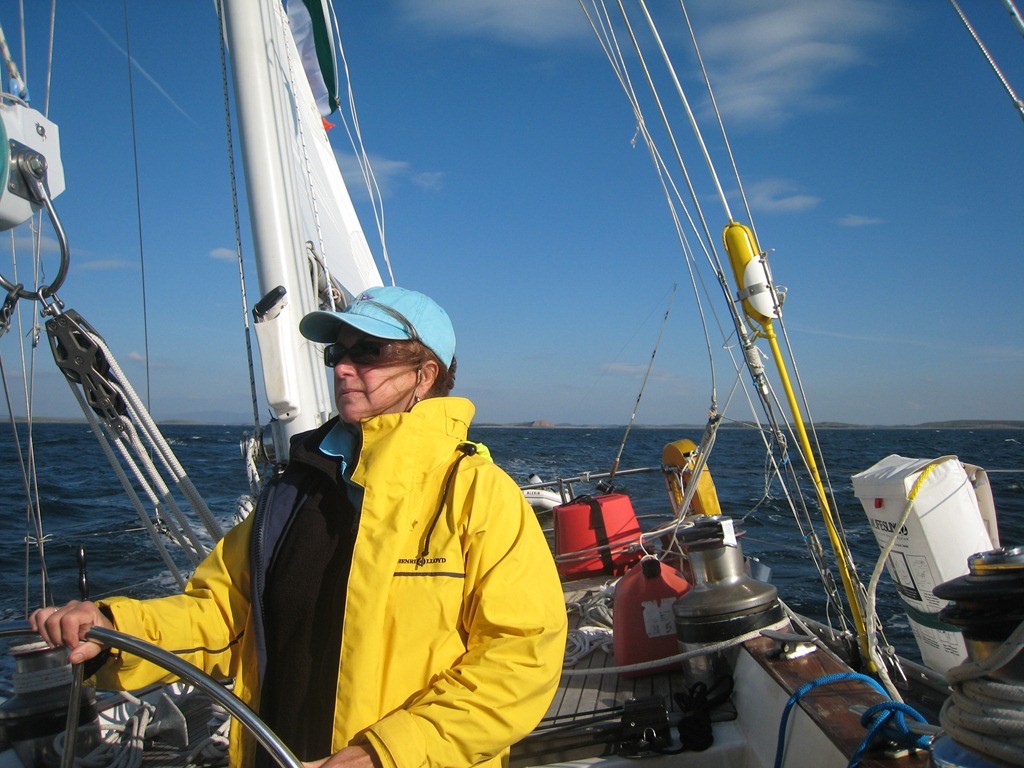Low DSC connect rate-Sailor irresponsibility or technological failure?
by Des Ryan on 27 Mar 2011

Daria Blackwell SW
Recently we published a http://www.sail-world.com/index_d.cfm?nid=80971!story about how few yachts had their Digital Selective Calling (DSC) equipped VHF radio connected to their GPS so that their position would be recorded in an emergency. The tone of the article suggested that the low take-up was an indication of the irresponsibility of sailors, but responses to Sail-World after the article suggest that the situation is more complex than this.
Here Alex Blackwell, long time cruiser and co-author of 'Happy Hooking: The Art of Anchoring', tells their tale of attempting to make the system work on their Bowman 57 ketch, Aleria, during the upgrading of the boat:
One feature of our new radio we were really excited about was Digital Selective Calling or DSC, which literally lets you dial up another boat, or a bunch of boats, just like using a telephone and then switch them all to a pre-determined frequency. Of course we have tested this with friends once they figured out what their MMSI number was.
However, in real life it would seem that nobody uses it, as it is neither intuitive nor all that easy to use. No, on a day to day basis, in all the countries we have cruised to, it seems that everyone still hails another boat on channel 16 or a designated local hailing frequency. This includes the professionally crewed mega yachts and their sometimes even bigger support ships. Even they hail each other on 16 before moving their traffic elsewhere. The only report we have heard of boats actually using DSC was a small fleet transiting pirate infested waters, where secretly hailing your friends is a really good thing.
The other feature that sold us on this radio, was that we could 'easily' connect it to our NMEA compliant chart plotter to receive a GPS feed. Our position would thus automatically be transmitted should we ever have the need to activate the built in emergency DSC broadcast. The radio would also display our Lat & Lon on its screen which we thought would be very useful at the navigation station for our log recording.
It took a while, but in the end we managed to find and then convince the technicians at both of the manufacturers to sell us the special connectors we needed to hook them together. As we are proponents of backups for everything, we had also acquired a second, though simpler, VHF with DSC along with a second chart plotter, this time both from the same manufacturer.
By now we were at a dock in the Canary Islands and assembled our installation crew together. Two guys were computer whizzes, one was big into Ham radios and knew everything, while the fourth was actually a professional marine electronics installer – at least they said they were.
They all had a personal interest in coming. Besides the ulterior motive of accessing our fridge full of cold beer, they were all having difficulty connecting their own GPS to their DSC VHF radios – and we had two very representative combinations: one upscale setup with two different manufacturers, and one lower end setup with both units from the same manufacturer.
We spent that afternoon and evening pulling wires and hooking things up and eventually called it a night in frustration. Next morning we continued swapping wires, soldering, and changing settings on the radios and GPS units all to no avail. Emails were sent and responses scrutinized.
After a couple of weeks with boats departing across the pond and new experts arriving, we too set off for the Caribbean, where we spent seven glorious months cruising the islands, all the while swapping advice with other cruisers on how to make our radios work.
We just had to stop worrying about the DSC and the GPS.
Alex and Daria Blackwell have not stopped worrying of course, but is the relative difficulty of making the connection and/or registering to blame for the relatively low take-up of the technology? It would seem so by the number of emails that we received suggesting similar problems to those encountered by these experienced and hardy cruisers.
The other issue is, if the technology is so good, why are there not fully integrated systems? Why is it necessary to have to use one cable to bring the GPS signal from any compatible external devices to the radios at low baud, and to use another cable to take the AIS information from the radio to the compatible plotter at high baud? Why don't VHF radios come with an integrated GPS receiver?
These are all good questions asked in emails, but it does not shift the responsibility from boat owners to continue to achieve the necessary connections and registrations, while encouraging boffins to make them more trouble-free, less complex and, hopefully, integrated.
For those who would like more information about the installation, connection and registration of current systems, there is an excellent article by the Cruising Club of America suggested by 'Suddenly Alone' lecturer Ron Trossbach, which is USA centred, but the information is largely relevant no matter which is your sailing home country.
It also includes full details of the formats for making a distress call, and the format comes in an easily printable form which would be an excellent form to retain on your boat. To obtain it, http://www.cruisingclub.org/pdfs/safety_dsc_distress_comm_form.pdf!click here.
About Alex and Daria Blackwell:
Alex Blackwell and his wife Daria are members of American Yacht Club in Rye, NY and Mayo Sailing Club, Ireland as well as the Irish Cruising Club (ICC) and the Seven Seas Cruising Association (SSCA). They are sailing the world in their Bowman 57 ketch, Aleria. You will find their book, 'Happy Hooking – The Art of Anchoring', available from Coastalboating.net and Amazon.com.
If you want to link to this article then please use this URL: www.sail-world.com/81751